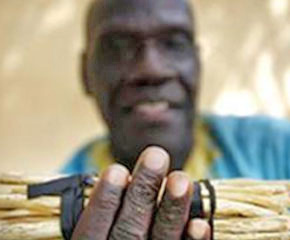Elimane Diop, extols the virtues of his wares with all the pride of a salesman for a multinational health care company, explaining the advantages of a new design of brush or type of dental floss.
“This is the Dakhaar, it cleans really well,” said Diop, holding up a slender, knotty twig with a dark brown bark. Another bush toothbrush, the Werek, is cut from the branches of the gum tree, while the thicker Neep-Neep helps ease toothache. “If you’ve a bad tooth, it’s a medicine,” said Diop.
Traders in Dakar and other Senegalese cities sell neat bundles of the pencil-sized sticks, usually about six inches long on the pavement, offering a variety of different types of wood at different prices.
The Cola, cut from a soft, whitish wood, is prized for its sweet taste. If chewed, most of the twigs fray into finer strands, which have the effect of “flossing” between the teeth, or if rubbed up and down, can scrub tooth enamel clean as well as any brush. But they can taste bitter compared with commercial toothpastes.
The World Health Organization has encouraged the use of chewing sticks as an alternative source of oral hygiene in poor countries where many cannot afford commercial dental products.
Although commercially made toothbrushes from leading international brands are available in Dakar supermarkets and pharmacies, many people say they prefer the chew sticks. The price must help. While a manufactured toothbrush can cost upwards of three hundred CFA francs (about R4), a chew-stick costs only twenty-five or fifty CFA.

